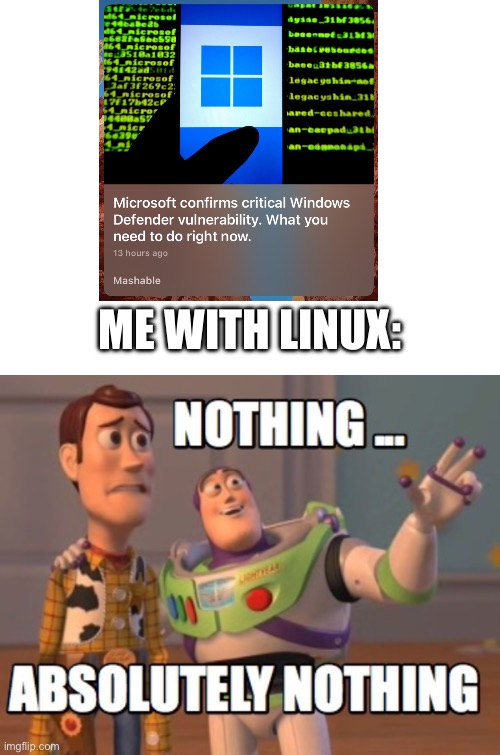this post was submitted on 17 Dec 2024
383 points (85.5% liked)
linuxmemes
21748 readers
1293 users here now
Hint: :q!
Sister communities:
Community rules (click to expand)
1. Follow the site-wide rules
- Instance-wide TOS: https://legal.lemmy.world/tos/
- Lemmy code of conduct: https://join-lemmy.org/docs/code_of_conduct.html
2. Be civil
- Understand the difference between a joke and an insult.
- Do not harrass or attack members of the community for any reason.
- Leave remarks of "peasantry" to the PCMR community. If you dislike an OS/service/application, attack the thing you dislike, not the individuals who use it. Some people may not have a choice.
- Bigotry will not be tolerated.
- These rules are somewhat loosened when the subject is a public figure. Still, do not attack their person or incite harrassment.
3. Post Linux-related content
- Including Unix and BSD.
- Non-Linux content is acceptable as long as it makes a reference to Linux. For example, the poorly made mockery of
sudoin Windows. - No porn. Even if you watch it on a Linux machine.
4. No recent reposts
- Everybody uses Arch btw, can't quit Vim, <loves/tolerates/hates> systemd, and wants to interject for a moment. You can stop now.
Please report posts and comments that break these rules!
Important: never execute code or follow advice that you don't understand or can't verify, especially here. The word of the day is credibility. This is a meme community -- even the most helpful comments might just be shitposts that can damage your system. Be aware, be smart, don't fork-bomb your computer.
founded 2 years ago
MODERATORS
you are viewing a single comment's thread
view the rest of the comments
view the rest of the comments

most servers actually also run linux, even microsoft(maker of windows) runs Linux on many of their servers. linux is just many times better in IO, ram , cpu, and networking. not only in compatibility and stability and security but also speed and latency. all those thigns matter to servers. that said many very small companies store things on a nas and then acces it with windows or mac computers. which can be very annoying if you work at such a place since then you have to use a unstable computer, which has almost no free ram or cpu and will chrash when it shouldn't and you aren't allowed to install Linux on it. but most of the internet runs Linux. actually GNU+Linux is by far the most used operatingsystem worldwide, not only pretty much all servers, and essentially all supercomputers run it, but android, and chrome os also are Linux, but they just run something like a box on it, and people only see the box instead of Linux. then many small devices also run it, and ofcource spacecrafts and such. in normal desktop use the score is much lower at around 2%, however that score is also affected a lot by how Linux users do not allow their os to be submitter automatically to some server, or that those are directly hosted by the developers who will not always share it with those public sources. next to that sites and such tracking what os people use are less likely to get the info from Linux users as they are much more likely to use security tools. steam might be seen as accurate as both on windows and Linux only select people use it, but then you only have that field of people, and then there was the bug where the steam hardware survey had a much smaller chance of triggering when running Linux(even though that might be fixed by now). based on stats for pc desktop use 1 in 50 people would use Linux on pc, however when looking at total use desktop is but a fraction from all computers worldwide.
I think the point of my comment is being missed a bit here friend. Servers and backend use Linux, sure. The actual number of Linux users is likely under reported as you say.
But I have yet to see Linux used as a workstation OS in a place of business. Every doctor, insurance broker, banker, registry, and retail place I've visited were using Windows machines to access their infrastructure. If Windows creates vulnerabilities at entry and exit points it can still compromise information.